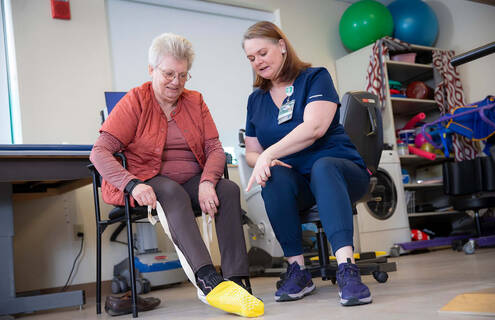
Occupational Therapists (OTs) have special skills that can help older adults stay in their homes with dignity as they age, a concept called “aging in place.” OTs assist with home modifications and safety, making it possible for older adults to live at home longer and with more independence.
This was explained by Dena Wilkie Wolff, MS OTR/L, CAPS, ECHM, owner of Home and Able, a consulting service focused on home modification and aging in place. Wolff recently spoke at Elder Forum, a monthly networking and educational event for professionals who work with older adults. She is an occupational therapist, a certified aging in place specialist, and holds an executive certificate in home modification.
Wolff’s presentation highlighted how OTs can help older adults return home safely after a hospitalization or health event. A study in the Journal of Housing for the Elderly describes aging in place as an ongoing interaction between a person and their environment as both change over time. According to AgingInPlace.org, older adults must be able to handle basic daily activities like eating, bathing, and using the toilet to live independently.
When helping clients age in place, said Wolff, OTs look at the big picture. This includes the client’s health challenges (such as chronic or progressive illnesses), their needs for returning home, their current abilities, and the support they will require. OTs work to help clients meet their goals at home, suggesting changes to the home or recommending tools. For example, they might suggest a long-handled reacher to help a client put on their pants if bending is difficult.
Wolff said OTs are creative problem-solvers who can identify safety risks and barriers that may prevent clients from living independently. “We’re like MacGyver in the home setting,” she explained. “We spot fall risks, recommend home modifications to prevent falls, and use creative solutions like rigging up hand-held showers.”
OTs also know about local resources to help clients get durable medical equipment. They often act as informal case managers, working with families to ensure clients have the support and services they need.
In addition to safety, OTs focus on activities clients enjoy, using them as part of therapy. For example, an older adult who loves baking might be motivated to work on skills like remembering recipes, staying safe around the oven, and staying focused.
According to Wolff, many people don’t realize the full value of OTs. “We prevent rehospitalizations and create the best outcomes with home modifications, helping clients perform everyday tasks. OTs are leaders in aging in place and home safety,” she said.
The Elder Forum meets virtually on the second Friday of each month, bringing together healthcare professionals and social service providers from Vermont and New Hampshire to discuss the latest in elder care.
Watch the December 13 session: “Occupational Therapists (OTs) in Non-Traditional Roles: Expanding Options for Caring for Older Adults at Home”. Learn about Home and Able here.
Our next session of Elder Forum will be on Friday, February 14 at 8 am via Zoom. For information or to join the Elder Forum mailing list, please contact Beth O’Donnell, APD Director of Community Health at odonnellb@apdmh.org.